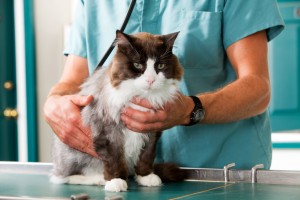 There is so much that goes into owning a pet – from the tiniest kitten to the biggest dog, and annual animal checkups are an essential part of keeping your pet healthy and happy.
There is so much that goes into owning a pet – from the tiniest kitten to the biggest dog, and annual animal checkups are an essential part of keeping your pet healthy and happy.
Let your vet help you provide the best care for each one of your fur-babies! Know what questions you’ll need to answer, and what questions you should be asking.
Regular Animal Check Ups
Rather than waiting until you see symptoms of illness to rush to the vet, going through annual exams might be a smarter choice. Why? Well, for starters, it helps your veterinarian identify problems before they become serious enough to show symptoms. Pets age faster than humans – a single calendar year can be 7 years of aging for Fido! Imagine not going to your own doctor for 7 years!
Many pet health conditions might go undetected for a long time unless your pet is closely examined or has a blood test. By the time symptoms are obvious, many pet health issues are already very serious. In addition, animals are conditioned to hide pain and illness – it’s a survival instinct that helps them stay alive in the wild. Animals hide pain and other symptoms. “Dogs have an instinct to hide their pain, like wild animals who avoid showing any sign of weakness that could cause them to become targets for death. Nature’s “survival of the fittest” makes hiding pain a good tactic in the wild. Unfortunately, it also means you might not be able to detect problems when they first appear.
If you already visit your vet once a year for vaccine boosters, regular animal checkups might be part of the deal – even if you didn’t realize it was happening. However, this is not always the case, as a lot of pet owners get their vaccines from ambulatory clinics, the local ASPCA or during a quick “drive-by” stop at the vet.
If your pet hasn’t had an annual exam in a while, here are a few reasons why it’s important to schedule one.
What an Annual Exam Includes
The first thing a vet (or a vet assistant) will do when your pet arrives for his checkup is to check his weight and take his temperature. This allows the vet to compare past stats and see if your pet’s weight has changed and whether that needs to be addressed. Losing or gaining weight for no apparent reason could be a sign of an underlying pet health condition such as diabetes.
Next, the vet will check the skin and coat, searching for any lumps that might need further testing. Older pets – a pet is usually considered senior when he reaches the age of seven, though this might differ slightly depending on the breed or size of your fur-baby – might also undergo a musculoskeletal exam, where the vet will touch the joint for signs of pain or inflammation. The ears and eyes are also examined, and the vet will check your pet’s heart rate and listen to his breathing.
Questions Your Vet Might Ask
During annual animal checkups, your vet will most likely ask you a number of questions to help understand any underlying pet health issues that might need to be investigated further. Whether this is your first meeting with that vet or you have been there before will affect the questions you hear. For example, a vet might ask you how long you’ve had your pet, whether he’s received his vaccines, and where you got her if this is your first visit. He will also ask what type of food you feed your pet.
Other questions you might hear from your vet:
- Have you noticed any changes in the eating or sleeping habits of your pet? How about his normal schedule? Is he playing less or acting differently?
- Are his bowel movements normal? What about the frequency with which he urinates?
- If you have a cat, your vet might ask whether he’s had any “accidents,” such as urinating outside the litter box and even what type of litter you’re using.
- Have you noticed any new or unexpected symptoms such as vomiting, sneezing, breathing difficulties, diarrhea or others?
These pet health questions are all meant to help the vet understand how better to help your pet, so don’t be afraid to share as much information as possible.
Doing the Dental
Once the general physical exam is completed, a pet dental exam is next. Because pets usually object to having fingers in their mouths, this is often a very light, general check where the vet will look for inflammation, bleeding or the presence of growths. If a more serious problem is suspected, your vet might recommend a full oral exam, which requires your pet to be sedated. Full exams are especially important in older animals or those with a history of mouth problems.
Don’t wait until you see symptoms that there’s something wrong; schedule regular annual animal checkups and keep your furbabies healthy and happy.

